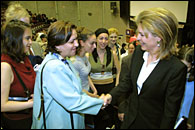Program guides peace
Many interesting and illustrious people have spoken at McGill's Beatty Lectures, but as Vice-Principal (Research) Louise Proulx said in her welcome May 23 to Queen Noor of Jordan, this is the first to be delivered by a member of royalty.
 Queen Noor greets admirers
Queen Noor greets admirersPHOTO: Owen Egan |
|
Queen Noor talked of her last visit two years ago to McGill to celebrate the McGill Middle East Program in Civil Society and Peace Building (MMEP), for which she's a spokesperson. Peace seemed much closer then.
"Tragically, we've seen an escalation of violence," she said to an appreciative audience early in her talk, "Creating a Culture of Peace." Each of us was struck to the core by the "monstrous manifestation of blind hatred on September 11." Truly no one is safe any longer, she continued. "The world has become more global and more fragmented at the same time."
For the Queen, the salve for strife is empowerment of the most vulnerable members of society. Violence can be fought by "strengthening tolerance, civil society and a world culture of peace."
She lauded the McGill program as providing the fundamental building blocks of democracy. University and non-governmental organization partners in Jordan, Israel and Palestine work and learn together with the aim of creating a culture of peace. Together they tackle poverty and inequality, providing access to aid and promoting engagement with civil society.
Fellows come to McGill for a two-year social work program, the first spent in Montreal learning interdisciplinary methods of social welfare, access to law, and social work. In the second year they return to their home countries to put into practice community-based social work.
With globalization comes increased opportunity, she said, but there is potential for exploitation as well as growth. The MMEP recognizes that social and economic instability and marginalization is the real threat to our security. Queen Noor urged that we place people before bureaucracy, flexibility before rigidity, and that passion must be put into government.
She sees how the university resources and expertise given directly to the people have benefited the region enormously. MMEP participants have set up literacy classes, health and legal clinics, food co-ops and improved access to water. They help local residents deal with the physical and emotional trauma of living in a violent society. Queen Noor gave an example of a social worker being able to track down a child missing for one and a half years in just one and a half hours, using his knowledge of the system.
Despite the recent turmoil in the Middle East, Queen Noor believes "peace is still within reach. It may seem less in reach, but we will never give in to pessimism." She takes succour from her late husband, King Hussein, and is inspired by him daily. He "demonstrated that peace was worth more to him than his own life," she said, adding that in 1985, he said, "Justice is the only foundation for security." King Hussein urged people to have hope in children, to trust their neighbours, and to have faith in the world. "Peace is not instinctive -- it's a skill that must be learned."
After the lecture, a questioner wondered why, if violence stemmed from social inequality, were terrorists often from the middle economic strata. The Queen responded that terrorists are still products of, and are responding to, their environment of economic and political inequality.
In response to a question about the role of media, Queen Noor spoke of the coverage of the Middle East by Europe and the United States as "radically different" due to politics and availability of information. She said that "Canada and Europe reflect the same larger awareness of history and cross-cultural issues more than the United States," which has a more "homogenous view, despite their variation." Canada has always set an example for assessing responsibility and policy, Queen Noor feels, and Europe "has a special understanding of war and conflict."
In an interview with Brian Stewart of "The National" the next morning, Queen Noor reiterated that the recent violence poses a challenge to peace, but to transcend the erosion of the peace process, it's time for the political leaders to reflect the will of the majority of people and take that leap of faith.
"Building peace is going to depend on recognizing one another's rights and abilities and essential role as partners together in emerging prosperity. Together they can achieve this. Separated and divided by these outrageous political divides, everyone loses."
In an interview with the Reporter, Queen Noor talked of how MMEP combines academic and vocational training. "Academics provide a very fundamental component of this program. You have academic support and real practical involvement in this program that is providing social workers and a new generation of activists working on the ground in these neighbourhoods." As Queen Noor said to Brian Stewart, she is pleased by indications that university students in North America have become more socially engaged and active, and that they believe they have an impact on the globalization process.

